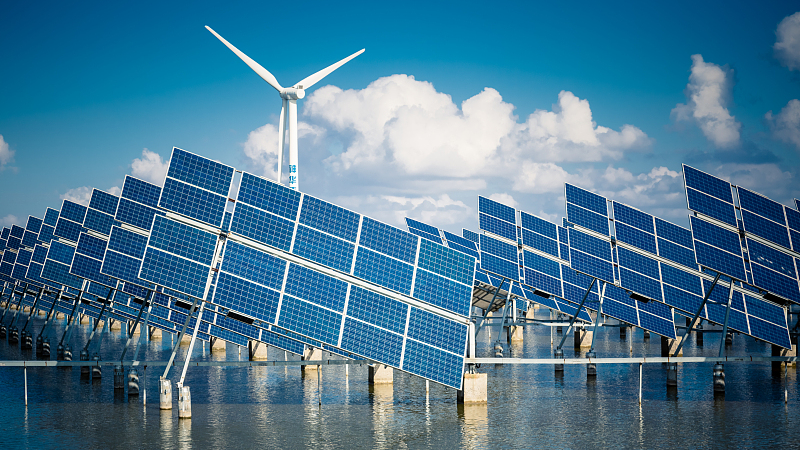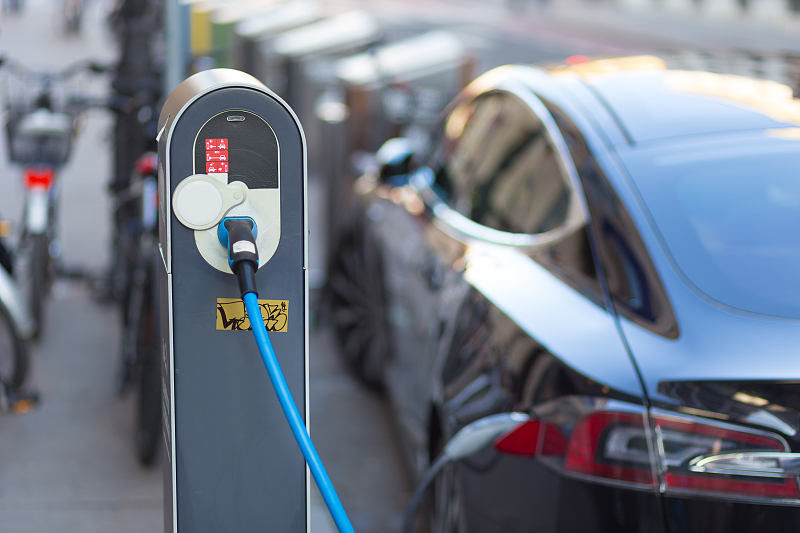
Wind and solar power plant. /CFP
Wind and solar power plant. /CFP
Editor's note: Djoomart Otorbaev is the former prime minister of the Kyrgyz Republic, a distinguished professor of the Belt and Road School of Beijing Normal University, and a member of Nizami Ganjavi International Center. The article reflects the author's opinions and not necessarily those of CGTN.
Along with COVID-19, one of the main topics of discussion in the outgoing year was the need for the fastest transition of humankind to a green economy. Massive pressure from numerous influencers on public opinion, assurances from politicians that there is no alternative to the transition to sustainable development, frequent large-scale forums contributed to creating a persistent myth that the use of fossil fuels is ending, and the era of decarbonization is rapidly approaching us. However, the last couple of months has led to massive events in the global energy market, which promptly sobered many aggressive supporters of a complete and final transition to sustainable development. The transition to green growth will be more complex and time-consuming than many thought.
This year, there has been a growing disagreement between leading politicians and major players in the energy market over the speed of the green transition.
This May, the International Energy Agency (IEA) made a particular statement that energy companies must stop all new oil, gas and coal projects to achieve zero net emissions by 2050.
Leading European politicians continue to pressure public opinion for the quickest possible green transition. In September, Frans Timmermans, the European Union's top climate change official, said record-high electricity prices underscored the need for such a transition. "Had we had the Green Deal five years earlier, we would not be in this position because then we would have less dependence on fossil fuels and on natural gas," said Timmermans, noting that renewable energy prices have remained stable even in the face of a sharp jump in fossil fuel prices.
At the same time, most of the serious players in the energy market are questioning the ability of the world economy to quickly adapt to the energy transition and point to numerous obstacles along the way.
Speaking at the World Petroleum Congress (WPC) in Houston, Texas, on December 6, Amin Nasser, chief executive of Saudi Aramco, said there is speculation that the world could switch to cleaner fuels "virtually overnight," but that this was "deeply flawed." He urged world leaders to continue investing in fossil fuels in the years to come, or there is a risk of rising social unrest and galloping inflation that will force everyone to abandon emission targets altogether. "The world is facing an ever more chaotic energy transition centered on highly unrealistic scenarios and assumptions about the future of energy," he stated. Nasser also said that most of the "key stakeholders" in industry and politics are intimidated. They agree with the severe risks associated with underfunding the sector but are reluctant to talk about it openly. "They say so in private… They should say the same in public," he said.

Electric cars at a charging station. /CFP
Electric cars at a charging station. /CFP
Jeff Miller, chief executive officer of the Halliburton Oilfield Services Group, told WPC delegates that the sector had experienced "significant under-investment" over the past seven years. He attributed both to unprecedented pressure from environmental groups and the lack of capital due to current nervousness in energy markets. These days, global investment in exploration and production has fallen 50 percent below historical norms, he said.
Natural gas is becoming the critical energy carrier for most developed countries. For example, despite plans for decarbonization in Germany, their officials predict it will remain the most crucial energy source for a long time. According to the Federal Statistical Office of the Federal Republic of Germany (Destatis), in 2020, it was natural gas became the primary energy source for industrial enterprises. Its share was 31 percent, followed by electricity (21 percent), oil and oil products (16 percent) and coal (16 percent).
This situation casts doubt on the feasibility of the energy plan of the "traffic light" coalition government of Germany. According to their goals, by 2030, up to 80 percent of electricity in Germany will have to be generated from renewable energy sources. In addition, the country aims to abandon nuclear energy and coal. Leading European experts do not believe in the reality of these goals. "80 percent of renewables with an electricity demand of 750 TWh by 2030 corresponds to 600 TWh of renewable energy sources and total gross electricity production in 2019," wrote Frank Peter, an analyst at Agora Energiewende. At the same time, the current renewable energy capacity in Germany is 53 GW for solar, 7.7 GW for offshore wind and 54 GW for onshore wind.
The combined share of solar and wind energy in the global structure of primary energy is still less than 10 percent. Therefore, it is pretty understandable that large-scale renewable energy sources worldwide will take much longer than anticipated than many believe.
The energy transition to a green economy will be complex and lengthy. It looks like that critical mistake in its implementation can be the excessive acceleration of the move away from fossil fuels, leading to underinvestment in exploration and production and a shortage of fossil fuels. Solar and wind power have been the cheapest in developed countries for about five years. And the more expensive fossil fuels cost, the faster consumers will switch to renewable energy sources.
In the meantime, while these disputes are ongoing, the spot prices for natural gas in Europe reached a historical maximum. According to the index of the most liquid European hub TTF, on December 21, the cost of January gas futures reached a record level of €182 per MWh, which corresponds to $2,150 per 1,000 cubic meters. The story of humankind's global green energy transition is becoming much more complex. Challenging times lie ahead of us.
(If you want to contribute and have specific expertise, please contact us at opinions@cgtn.com.)

